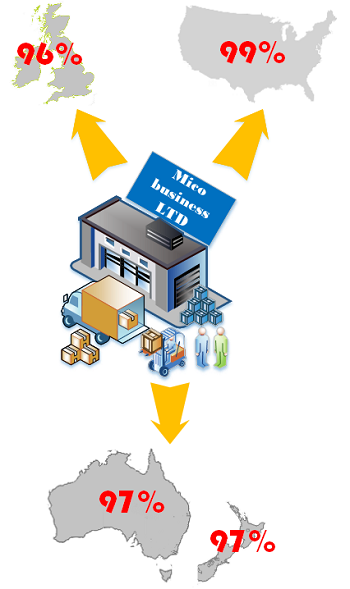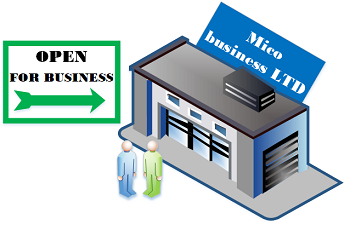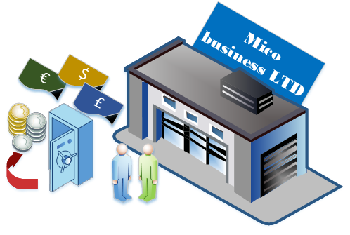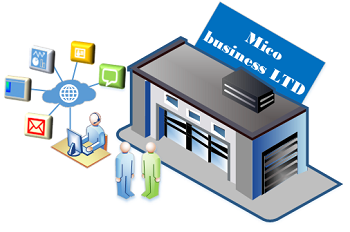A "micro-businesses" it is a company that has 7 employees or less (including the owners); it is also the most popular (dominating) business model in the world;
The figure presents the percentage of micro-businesses (against small, medium and enterprise businesses) in Australia, New Zealand, United Kingdom and the United States Of America. The reasons why the micro-business model is so popular include:
- It appeals to individuals who want to build a business that meets their personal and professional needs.
- Is easy to start, requiring very little capital to setup and operate.
- It is flexible, adaptable and responsive in the way it delivers products and services to its customers.

In this article series Astute explores and discusses:
- Starting a new micro-business venture using a customer-centric business approach.
- Micro-business challenges, what to avoid, common reasons for (micro-business) failure and how to address these challenges; ensuring the successful and profitable operations of micro-businesses.
- How the use of cloud based services can be leveraged by owners and operators to overcome the challenges required to establish and operate a successful micro-business.
So you have an idea or concept you want to sell in a business.
Congratulations !
Astute recommends adopting a customer-centric business approach when starting a new business.
A customer-centric business always considers customer impact before making decisions on structure, operations, products and services.

When you becomes a customer-centric business:
- You truly understand what your customers are trying to achieve (or solve) you will be offering products and services that make a real difference to their business or their life.
- The regular contact with your customers allows you to identify early market trends and other environmental or economic factors. Information you can use to adjust your products and services and maintaining your competitiveness in the marketplace.
- You have a working relationship with your customers; this means they will be more understanding and patient when the occasional thing goes wrong. This means you have a little more flexibility and time to resolve any issue and get things back on track.
Astute has incorporated the customer-centric business model in our free to view article - a nine step approach to starting your own micro-business.
Owners and operators of successful micro-businesses have experienced and overcome a unique set of challenges. Unfortunately micro-businesses typically fail because these challenges have not been understood and overcome by the business owners. Statistically:
- 74% of New Zealand businesses established in February 2007 were not operating in 2017
- 28% of Australian businesses established in June 2007 were not operating in June 2009
- 55.9% of UK businesses
established in 2011 were not operating in 2015. Refer
https://www.ons.gov.uk/businessindustryandtrade/business/activitysizeandlocation - 62.5% of American businesses established in 2007 were not operating in 2015

In this article Astute identifies, in order of impact, six common challenges that owners and operators have to address and overcome to establish and operate a successful, long term micro-businesses.
6. Customers do not understand or (worse) do not value the micro-business products and services
Owners and operators must know and understand their target markets; ensuring that current and future customers can see the benefits and value of the micro-business products and services.
To address and overcome this customer perception and value challenge Astute recommends that micro-business owners and operators apply the customer-centric approach; understanding what your customers are trying to achieve (or solve) and offering products and services that make a real difference to their business or their life.
5. Insufficient marketing content and inefficient (sales) conversion processes
There is not enough published information for visitors to understand what products and services are being offered and / or when a visitor decides to purchase, complexity and errors experienced in registration and setup discourages the visitor from paying.
Owners and operators must ensure that it is easy and simple for:
- Visitors (potential customers or leads) to find useful information about the micro-business products and services.
- Converted visitors (i.e. new customers) to register, pay and access the products and services.
4. Creating and nurturing the "micro-business culture"
Employees, representing the business, deal daily with the customers of the business. Bad experiences with employees is a major contributor to the micro-businesses losing customers.
Poor, weak, hostile and confusing cultures and attitudes are the major reason employees leave micro-businesses; employees leaving the business result in unplanned costs and effort to replace them. Great business cultures retain employees and (in-turn) retain customers.
It is essential that owners and operators create, encourage and support the development of the micro-business customer-centric culture.
3. Simplifying and automating the micro-business back office systems
Micro-business owners and operators typically implement back office systems using a mix of paper, spreadsheets and informal employee and customer related practices and processes.
This approach will work for a small number of customers (possibly less than 10). This approach will fail once the demand for products and services grow.
Customer and staff dissatisfaction and a loss of sales revenue and productivity are the results of complex and manual back office processes.
Owners and operators must develop a back office approach or strategy that supports the business as it grows; the Astute business cloud IT strategy is an approach micro-business owners and operators can use to simplify and automate the micro-business back office systems.
2. Owners and operators are working in the business, instead of working on the business
Each of the challenges listed in this artice require the attention of the micro-business owners and operators.
If theses challenges are not addressed in a timely manner, owners and operators end up working in the business; caught up in the detail and distractions of day to day operation of the business; not focused on understanding and growing their business; missing opportunities, losing customers (to competitors) and losing touch with their market.
Astute recommends that owners and operators work to remove themselves (and a minimal interaction with) from the day to day operations of the business. Focusing on working on the business; addressing the challenges listed in this article; understanding their market, their customers and developing strategies and approaches that grow their business.
1. Poor cash flow management
Poor cash management is the most common reason that micro-businesses fail. Cash flow misconceptions include:
- Making sales does not mean the business has cash. Customers may defer or even cancel purchases with short or no notice.
- Inventory is usually paid for (from cash reserves), stored (incurring additional costs) until it is sold. Buying inventory puts the business in more debt; the debt cannot be addressed until the products and service are sold.
- Increased sales increases the demand on cash flow. E.g. building more inventory, delivering more products (at cost) where customers delay payments.
- Selling to businesses result in good customers but results in longer and unreliable re-payment cycles.
Cash flow is not intuitive; cash flow needs to be monitored and understood by owners and operators over time and as business conditions change. Astute recommends that owners and operators monitor and track business expenses, orders, sales and inventory; capturing:
- The average number of days for receipt of payment
- The average number of days that inventory is retained (before delivery to customers) and the associated amount of capital required to purchase and store the inventory
- The average number of days by which the business vendors must be paid
Owners and operators then use this information to estimate and project (at least 12 months in advance) the cash flow position of the business.
In our next article Astute will discuss how owners and operators can leverage cloud services to address the challenges required to establish and operate a successful micro-business.
In this article Astute nominates cloud products and services that, when used, assist owners and operators to overcome the the six common challenges identified when establishing and operating a successful, long term micro-businesses.
Astute's consultancy services are also used by businesses to assist in the comparison and selection of cloud products and services that assist micro-businesses to overcome these challenges. Simply contact us or take advantage of our free and no obligation consultancy offer.

Cloud products and services used to overcome each of the six common micro-business challenges.
6. Customers do not understand or (worse) do not value the micro-business products and services
5. Insufficient marketing content and inefficient (sales) conversion processes
Cloud based marketing and customer (experience) products are used to assist business owners to overcome the above two challenges. Products business owners can consider include:
- Hubspot, Marketo and Zoho for marketing services.
- Zoho Survery, Survey Monkey and CustomerSure for customer surveys.
4. Creating and nurturing the "micro-business culture"
To overcome this challenge Astute recommended that (as part of a customer-centric approach) the micro-businesses develop process and practices to attract, recruit, develop and retain employees using cloud product and services like:
- Seek, LinkedIn, TradeMe and Indeed to attract candidates.
- OPRA and Podium365 for candidate psychometric testing.
- Zoho People, WebHR and Zenefits HRIS to develop and retain staff.
3. Simplifying and automating the icro-business back office systems
To overcome this challenge micro-business owners and operators can review and select cloud based Enterprise Resource Planning (ERP) products such as Oracle NetSuite, Acumatica Cloud ERP, IQMS Cloud / SaaS and Epicor Cloud.
2. Owners and operators are working in the business, instead of working on the business
Astute recommends that the micro-business owners and operators leverage cloud based "business and product development" tools to develop and validate business growth opportunities. Cloud based business and cloud product development tools include Oracle Product Lifecycle Management, Javelin and Qualtrics.
1. Poor cash flow management
To overcome this challenge micro-business owners and operators must invest in and rigorously use cloud based financial (and cash-flow) management tools such as Xero, MYOB Cloud, Oracle NetSuite, Quickbooks Cloud and Zoho books
Astute's free and with no obligation consultation offer allows businesses to take advantage of our mobile and cloud consultation capabilities to:
- Review and determine whether the business goals are being met and supported by their technology.
- Investigate a current technology issue or provide advice on a upgrade or expansion.
- Develop and support mobile applications for the business.
- Assist in the comparison and selection of cloud products and services that assist owners to overcome challenges experienced when operating a micro-businesses.
To take advantage of our offer simply register for the Astute free and no obligation mobile and cloud consultation .